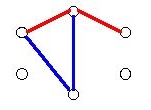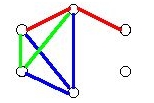
Is there a strategy for winning? What is it? Does it help to be a first or second player?
If the graph you are playing on is big enough to guarantee there is a winner, the first player has a winning strategy. Suppose the second player had a winning strategy -- that is, he or she has a way to guarantee they get a triangle before the other player. Then the first player can make a random move to start, and then follow the second player's strategy, this argument is called strategy stealing. The same argument can be used to show that any time there is a winning strategy, the first player has it. But this tells us nothing about what the winning strategy is!
Suppose you are playing on a graph with six vertices -- big enough to guarantee there is a winner. If the first player makes his or her first two moves from the same vertex (so that the second player's first edge does not form the third edge of this triangle) then the second player is forced to color the third edge of this triangle.

Then the first player can draw a third edge from the same vertex which guarantees that there are two choices to complete a triangle on the next turn (shown in green) -- and the second player can't block both of them! Therefore, the first player can win in four moves.

Therefore this gives one winning strategy. Would it work for four vertices? Five vertices?